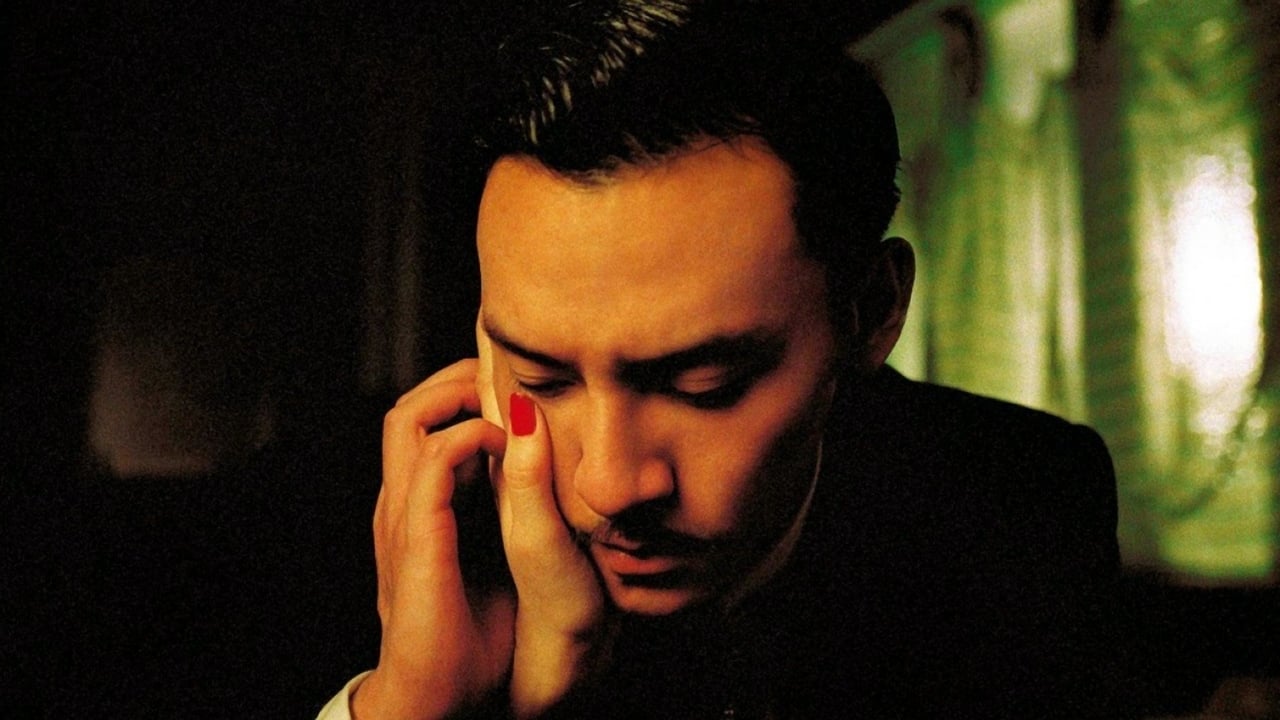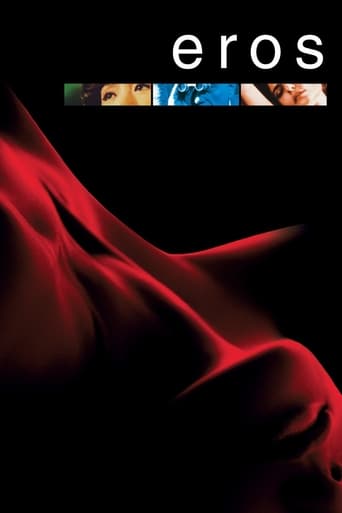



One of the best films i have seen
I cannot think of one single thing that I would change about this film. The acting is incomparable, the directing deft, and the writing poignantly brilliant.
View MoreThe film may be flawed, but its message is not.
If you like to be scared, if you like to laugh, and if you like to learn a thing or two at the movies, this absolutely cannot be missed.
View More"Where is the thread now? Off again! The old trick! Only I discern the infinite passion, and the pain, of finite hearts that yearn." – Robert Browning"There are no sexual relations." – Jacques Lacan "Paint not the thing, but the effect it produces." - Mallarmé "Eros" is comprised of three short films, one by director Wong Kar-Wai, one by director Steven Soderbergh and one by Michelangelo Antonioni. The topic of each film is "love", Wong's film a melodrama about a tailor's infatuation with a woman whose dresses he makes and Soderbergh's involving a zany discussion between an advertising executive and a psychotherapist. The meta-story here, though, is of Soderbergh and Wong's love for Antonioni, whom both cite as an influence and inspiration.Unsurprisingly, Antonioni's contribution to "Eros", "The Dangerous Thread of Things", is the most interesting film of the bunch. Shunning the melodrama of Wong Kar-Wai and the nervous tics of Soderbergh, Antonioni instead adopts a more metaphysical tone. The result is a film which has a lingering, haunting sought of impact.As with many of Antonioni's films, "The Dangerous Thread of Things" is less a love story than an "end of love" story. Our main characters, Christopher and Chloe, are ex lovers whose relationship is coming to an end. The film opens with Chris oblivious to Chloe's posed, naked body. They then spend their day bickering and reminiscing about better times, both simultaneously wishing to be free of the other and yearning for a time when things were right between them. Christopher's solution to their problems is to have immediate sex. "Sex is more than you think it is," Chloe sighs.Midway in the film our couple spy several nymphs frolicking beneath a waterfall, and later see a beautiful woman riding on a horse. Chris pursues this woman, following her to a castle whose walls recall the rocky outcroppings amongst which the nymphs played. Chris enters this castle, stepping into cave-like shadows. There he finds the woman. Her name is Linda, Antonioni's representation of a kind of wild, chaotic, independent, but simultaneously idealised, femininity.Cut to Linda masturbating, alone, on a bed. As she climaxes, Antonioni cuts to a shot in which his camera vacates a narrow tunnel to reveal Chris alone on a rooftop next to a metal rooster (literally a cock). The symbolism here is uncustomarily clunky for Antonioni. Moments later Linda and Chris do have sex, however its anticlimactic and the scene ends with Chris literally worshipping at her feet. He's forever entranced, but dares not to pull at her "dangerous threads". To pull, to investigate further, would be to unravel the whole image. Instead he leaves her there, alone in the castle, lost in his mind space.The film ends with Chloe and Chris speaking on the phone. Time and space separate them, but they wish to reconcile. To fix their relationship. Chloe spies some wild horses in the distance and tells Chris that she needs to go retrieve them. Whilst in search of the untamed horses she finds Linda naked on a beach. In an instant, Chloe is also naked. Their shadows come together, though Chloe's shadow, scrawny and flawed, ultimately overshadows Linda's buxom silhouette. Speaking of this moment (30 years before filming it, in one of his notebooks), Antonioni says it is meant to suggest a confrontation between enemies, but also heartache and a friendship. Antonioni holds the image, forces his audience to think about what he's just revealed. Fade to black.Antonioni directed "The Dangerous Thread of Things" when he was 92 years old, crippled, wheelchair bound and had lost the use of his eyes and voice. The director made two masterpieces in his later years, "Michelangelo Eye to Eye" and "Beyond The Clouds", two of his most powerful, formally beautiful films. Unfortunately "The Dangerous Thread of Things" does not reach these heights. Its sound dubbing is terrible, Antonioni's symbolism is clunky, his lighting plain and the film as a whole lacks the moody, dreamy polish of his best works. Notice these are all aesthetic problems, the flaws of a dying artist unable to muster the energy to command the camera and mould his cast. The actual content of the film haunts, and its the only film in "Eros" which actually sticks its claws into you. Even Antonioni's deathbed works posses an invisible power which few directors can replicate.7.5/10 – This review has focused on Antonioni's instalment, but Wong Kar-Wai's short film is also quite good. Revolving around a tailor and the prostitute he is infatuated with, the film suggests that creativity, or specifically the drive for perfection (the sewing of perfect clothes), is driven by the compulsion to cancel desires or to attain the unattainable. Though doomed to failure, humanity forever strives for what is out of reach. Soderbergh's film is the lesser of the three, though fans of actor Robert Downey Junior may find it interesting.Worth two viewings.
View MoreMichelangelo Antonioni creates a small masterwork. Steven Soderbergh and Wong Kar Wai, unfortunately, are not up to his standards. Still, one great work out of three efforts rewards the viewer The silence of Antonioni's work continues to echo the emptiness of our modern world. Behind the silence is that secret violence that shapes our lives. Soderbergh has declined a bit in his vision, but the old master retains lucidity and insight. The DVD is excellent. I recommend watching the Antonioni work first. Then put the DVD aside for a moment when you tire of commercial television and holiday parades and endless football scores. The non-Antonioni sections are worse than American football. Watching them will improve your appreciation of televised American football.
View MoreWong's film seems to come from the same universe as In the Mood for Love and 2046, which does give you the feeling of been-there-done-that. But, still, it is beautiful and nearly as hypnotic as those two films. Soderbergh's film is slight, but highly amusing. Robert Downey Jr. and Alan Arkin are fantastic. Antonioni's segment is pretty worthless. It feels like European softcore art-porn. But, really, would it surprise anyone that his film is the least of this bunch? As far as cinematic history is concerned, Soderbergh shouldn't be mentioned in the same sentence as Wong, and Wong probably not quite in the same sentence as Antonioni. But, let's face it, Antonioni hasn't made a good film in three decades. I'd still suggest watching Eros for the first two segments. If you can keep your curiosity in check, just shut it off before the third begins.
View MoreFor fans of Wong Kar-Wai, his segment "The Hands" is a must-see, as it ranks among his best, most fully-realized works. A truly stunning piece of work that not only summarizes everything great about his film-making, but which is also more focused and less indulgent than some of his more recent work. Unfortunately, the other two segments, from Steven Soderbergh and Michelangelo Antonioni respectively, don't fair nearly as well. Soderbergh's piece, titled "Equilibrium", is a tediously self-conscious exercise in cerebral cleverness, typical of his attempts at uncommercial "art" film-making (as opposed to his usual faceless Hollywood products). It is basically the cinematic equivalent of an obnoxious faux-intellectual laughing at his own "witty" joke. It only further proves what a truly cold, soulless filmmaker Soderbergh is that his segment of an anthology film supposedly based around the theme of sex is completely devoid of sensuality of any kind. Antonioni's closing segment (baring the appropriately pretentious title "The Dangerous Thread of Things") fairs slightly better, but not enough to prevent it from being a sad near self-parody from what was once one of cinema's leading lights. It is tempting to blame Antonioni's stroke (which rendered him wheelchair-bound and mute in 1985) for his piece's dirty old man sensibility (parts of it approach bad soft-core porn), but even that doesn't excuse the film's sheer almost laughable (if it weren't so tragic) pretentiousness. It could nearly pass as a parody of obtuse, incomprehensible European art films. That said, the film is still more than well worth watching for Wong Kar-Wai's film alone. Since it comes first in the chronology, you can easily watch it and then turn it off before the other two.
View More